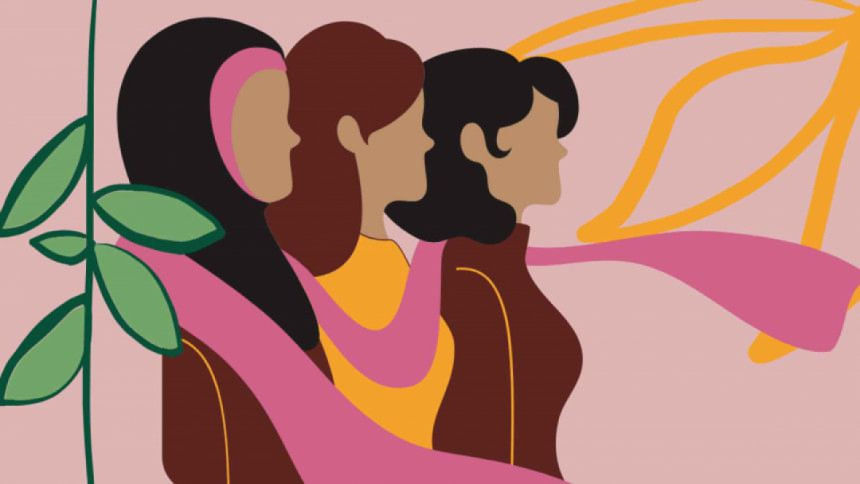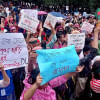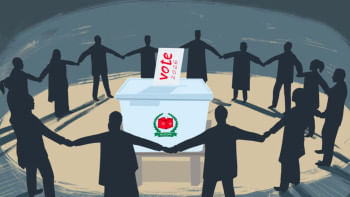Why the reproductive autonomy of women must be ensured

Bangladesh's population has been estimated to be 17.55 crore, half of whom are women. The United Nations Population Fund (UNFPA) disclosed this estimation in July in its annual flagship publication, the State of World Population 2025. Given that the global population currently stands at 823 crore, the population of Bangladesh accounts for two percent of the global total. Furthermore, the average life expectancy of both men and women in Bangladesh is now higher than the global averages. While the global male life expectancy is 71 years, for Bangladeshi men, it is 74 years. Similarly, the female life expectancy in Bangladesh is 77 years, while its global average is 76 years. The report highlights several key demographic implications.
First, with two-thirds of the population (11.5 crore) in the 15-64 working-age bracket, Bangladesh has an opportunity to leverage a demographic dividend. However, this group must support a growing elderly population—seven percent or 1.2 crore aged 65 and over—who are living longer, which has monetary and caregiving implications, particularly for women.
Second, adolescents make up about 20 percent or 3.3 crore people in the country. They represent a big proportion of the dependency ratio and thus are to be supported by the rest of the population. The broader youth cohort—nearly five crore—makes up 28 percent of the population. On one hand, they can reap the benefits of the demographic dividend as they can be the driving force for creativity and innovation for development. On the other hand, if these young people are not turned into human capital and productively employed, they can swell Bangladesh's current unemployment pool of 27 lakh. At present, the youth unemployment rate ranges between 10-12 percent, much higher than the overall unemployment rate in the country.
Thirdly, Bangladesh has achieved a replacement-level total fertility rate of 2.1. Despite this, challenges such as high rates of adolescent pregnancy, driven by early marriage and limited access to reproductive health education, persist.
The theme of the UNFPA's report is "The Real Family Crisis - The Pursuit of Reproductive Agency in a Changing World." It challenges the dominant narrative of "too many" or "too few births" and argues that the real crisis is not about numbers; rather, it is a crisis of reproductive agency. However, in Bangladesh's context, both these narratives are meaningful and relevant. The total population of Bangladesh is a concern from two angles. First, given the land size of the country, its population density is the highest among countries with a population of over 10 million. Over the past 50 years, the population of Bangladesh has more than doubled, but the country's land area has remained the same.
The issue of reproductive agency is also important. People, especially women and young people in Bangladesh, are unable to realise their reproductive intentions due to systematic, economic and social barriers. About 77 percent of women in the country are unable to make their own decisions about childbearing, significantly higher than the global average of 63 percent. Similarly, only 23 percent of Bangladeshi women have been able to achieve their desired number of children, while the global average is 37 percent. These numbers reflect the absence of reproductive autonomy of Bangladeshi women, which is due to a series of factors ranging from economic dependency, lack of education and healthcare, social pressure and above all, patriarchy.
Unintended pregnancies are widespread in Bangladesh, and the reasons are varied. About 11 percent of the Bangladeshi women cannot make independent decisions on contraception, 16 percent have been pressured to have a child against their will, and 15 percent were pressured to use contraception, even when they wanted a child. Another 10 percent were unable to access essential healthcare services, while one in every three women stated that they were unable to refuse sexual intercourse. As a result, 33 percent of women in the country experienced unintended pregnancies. Social and gender norms continue to pressure girls into early marriage and motherhood. All these contribute to the unpaid care work burden, gender-based violence and further deterioration of women's reproductive autonomy. On the other hand, economic hardship, high healthcare costs, and unaffordable childcare, lack of paid parental leave, force many families to delay and even forego parenthood.
Enhancing the reproductive autonomy of Bangladeshi women will have to be supported with essential reproductive health services, a robust midwifery workforce, and a steady supply of medicines and contraceptives. It would also require comprehensive sex education, affordable housing, affordable child care and paid paternal leave. All these would need more public resources devoted to the health sector. The current allocation of 0.7 percent of GDP and two percent of the national budget to health expenditures is simply unacceptable, not only by the global standard, but also by the regional standard. They must be raised to at least five percent of GDP and 15 percent of the national budget. Let us ensure that reproductive decisions in Bangladesh are supported, and not judged and let every person in the country plan their life with choice, freedom, safety and dignity.
Selim Jahan is former director of the Human Development Report Office under the United Nations Development Programme (UNDP) and lead author of the Human Development Report.
Views expressed in this article are the author's own.
Follow The Daily Star Opinion on Facebook for the latest opinions, commentaries, and analyses by experts and professionals. To contribute your article or letter to The Daily Star Opinion, see our guidelines for submission.

 For all latest news, follow The Daily Star's Google News channel.
For all latest news, follow The Daily Star's Google News channel. 










Comments